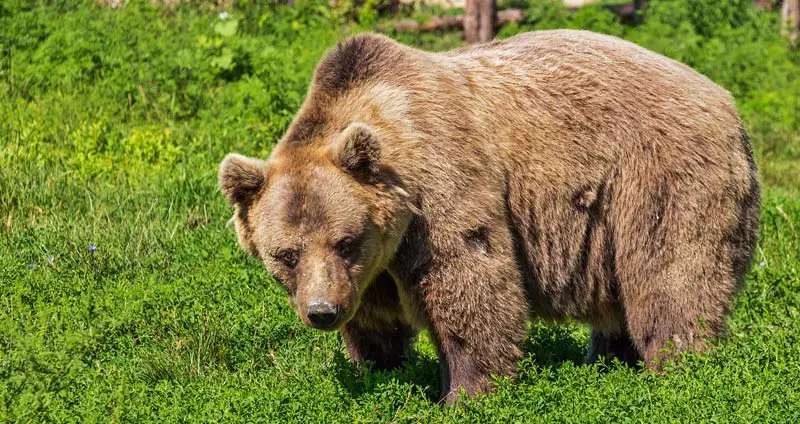Everyone’s aware of the fact that bears are absolutely massive creatures. The sheer size and strength that they display is unparalleled by other animals. However, not many people know just how much some species of bears can weigh.
There are a lot of factors that determine a bear’s weight, but the average weight for most bears is between 250 and 500 pounds once the bear has reached maturity. This number can fluctuate depending on the time of year and whether or not the bear is pregnant or preparing for hibernation.
Some bears weigh much more or much less than this average, though. Some smaller species typically don’t weigh above 100 pounds, such as the Sun Bear. However, some larger species can easily exceed 1000 pounds, such as the Polar Bear.
Below, we’ve highlighted 10 types of bears and how much they weigh so that you can get a better idea of the size of these creatures.
Table of Contents
10 Examples Of Adult Bear Weights
| Type of Bear | Avg. Male Weight | Avg. Female Weight |
|---|---|---|
| Sun Bear | 95 pounds (43 kg) | 85 pounds (39 kg) |
| Sloth Bear | 240 pounds (110 kg) | 165 pounds (75 kg) |
| Panda Bear | 250 pounds (113 kg) | 220 pounds (100 kg) |
| Asiatic Black Bear | 285 pounds (129 kg) | 180 pounds (82 kg) |
| Andean Bear | 330 pounds (150 kg) | 130 pounds (59 kg) |
| American Black Bear | 340 pounds (154 kg) | 230 pounds (104 kg) |
| Brown Bear | 480 pounds (218 kg) | 335 pounds (152 kg) |
| Grizzly Bear | 600 pounds (272 kg) | 345 pounds (155 kg) |
| Kodiak Bear | 1000 pounds (454 kg) | 550 pounds (249 kg) |
| Polar Bear | 1100 pounds (500 kg) | 440 pounds (200 kg) |
What Determines A Bear’s Weight?
While it is possible to state a broad range for the weight of a bear, it isn’t a range that’s applicable to every type of bear throughout the entire year. There are several different factors that play into the weight of a bear, and all of them need to be considered when determining how much a bear weighs or what its potential weight is.
- Species –The largest determining factor for a bear’s weight is the species of that bear. A good amount of diversity exists in terms of sizing between bear species, so this will have a large impact on the overall weight of the bear. Smaller species that don’t need to be large and strong will typically weigh well under 300 pounds, but can even weigh less than 100 pounds in some cases. Larger species that either need extra size to hunt or extra skin and fat to stay warm can weigh well over 500 pounds, with some species approaching or exceeding 1000 pounds.
- Age –Age will, of course, determine how large a bear is. Most bear cubs are born around 1 pound, but quickly start to grow and gain weight from there. Juvenile bears tend to still weigh under 100 pounds and really start to gain weight as they approach maturity. As bears become older and can no longer hunt as successfully, they may start to lose a little bit of weight; but typically nothing too drastic.
- Time of year -A bear’s weight fluctuates throughout the year, largely due to the fact that they hibernate. During the summer, bears will gorge themselves on carbohydrate-rich berries and other foods to bulk up and gain weight. Bears can put on as much as 30 pounds per week during their bulking period! This can cause a bear to weigh several hundred pounds more right before hibernation. Additionally, after mating season, female bears will gain several hundred pounds if they’ve become pregnant. Female polar bears can double in weight during pregnancy!
Largest Bears Ever Recorded
While most bears will grow to be around the weights listed in the table above, there are going to be some outliers. Over the years, there have been some absolutely massive bears that have been recorded, weighing substantially more than the average weight for their species.
Heaviest Black Bear
In 1976, a male American black bear was hunted in New Brunswick. It weighed 902 pounds after it was dressed, meaning that its estimated live weight was right around 1,100 pounds. It’s length from tail to nose was 7.9 feet, which is quite a substantial length for a black bear.
Heaviest Grizzly Bear
The largest grizzly bear ever hunted was in 2014 in Lone Mountain, Alaska. This specimen stood about 9 feet tall and was estimated to weigh over 1,600 pounds. A larger skull was found much earlier in 1976, which could definitely have belonged to a bear weighing more than the 1,600 estimated pounds of the Lone Mountain grizzly.
Heaviest Kodiak Bear
A captive kodiak bear named Clyde that lived at the Dakota Zoo weighed 2,130 pounds after his death in 1987. The zoo director estimated that Clyde actually weighed around 2,400 pounds a year earlier when he was more healthy. Even in death, though, Clyde had a fat layer that was 9 inches thick, resulting in him having quite a high weight for his size.
Heaviest Polar Bear
The largest polar bear ever recorded, and subsequently the largest bear on record, was a 2,209 pound male that was hunted in 1960 at Kotzebue Sound, Alaska. This weight is twice what polar bears typically weigh, making this an insane specimen. When standing on its hind legs, this bear was able to stand over 11 feet tall.

